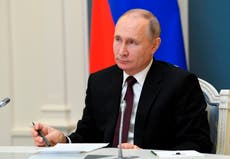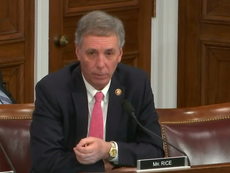The Top 10: Returns From the Political Wilderness
Great comebacks from having been cast into the outer darkness


Your support helps us to tell the story
From reproductive rights to climate change to Big Tech, The Independent is on the ground when the story is developing. Whether it's investigating the financials of Elon Musk's pro-Trump PAC or producing our latest documentary, 'The A Word', which shines a light on the American women fighting for reproductive rights, we know how important it is to parse out the facts from the messaging.
At such a critical moment in US history, we need reporters on the ground. Your donation allows us to keep sending journalists to speak to both sides of the story.
The Independent is trusted by Americans across the entire political spectrum. And unlike many other quality news outlets, we choose not to lock Americans out of our reporting and analysis with paywalls. We believe quality journalism should be available to everyone, paid for by those who can afford it.
Your support makes all the difference.This was originally suggested by Anthony Wells four years ago. Since then we have done the Top 10 Quickest Returns to the Cabinet, but now the time has come, prompted by The Sunday Times putting a new twist on the evergreen report that Tony Blair is “planning a comeback to frontline politics”, which has featured in the British press on average every three weeks or so since 2007.
1. Charles de Gaulle. The Sunday Times reported on 10 January that Tony Blair “seeks a ‘de Gaulle-style comeback’”. De Gaulle became prime minister in 1958 at the age of 67, which was 12 years after he stood down, having led France out of the Second World War. He had “retired” to his rural retreat in Colombey-les-Deux-Eglises in 1946, but returned to lead the country for another 10 years.
2. Marquis de Lafayette. A leading figure in the early stages of the French Revolution and then 40 years later helped the July Revolution that deposed Charles X in 1830. Thanks to Simon Cook.
3. Winston Churchill. By 1939, when he returned to cabinet as First Lord of the Admiralty before becoming prime minister the following year, “he had been out of government for 10 years and many thought he was out of touch”, said Nigel Fox.
4. Grover Cleveland. Thus far has been the only defeated US president to have returned to office after a period out of it: he was president 1885-89 and 1893-97. “After his 1888 defeat by Benjamin Harrison, he worked for a law firm. He lost the Democrat nomination at the end of his second term and became an academic; this time he didn’t come back,” said Cole Davis.
5. George Canning. Rising star and minister at 25, he was foreign secretary at the age of 37, dominating the cabinet and dictating naval strategy in the war with Napoleon. But he duelled with Castlereagh, secretary of state for war, in 1809 and was shot in the leg. He refused high office in any government that included Castlereagh for 13 years until the latter’s suicide in 1822. Canning then replaced him as foreign secretary until he was chosen by George IV to become prime minister – for a mere 119 days before he died in 1827. Thanks to James Dinsdale.
6. Aung San Suu Kyi. Spent most of the two decades from 1989 to 2010 under house arrest before becoming prime minister of Myanmar in 2016. Nominated by Paddy Briggs.
7. Juan Peron. President of Argentina 1946-55, deposed by a coup and exiled, before returning as president for nine months before his death in 1974 at the age of 78. Another from Paddy Briggs.
8. Deng Xiaoping. Purged twice by Mao Zedong during the Cultural Revolution, including four years working in a tractor factory in the early 1970s, but after Mao’s death in 1976 emerged as leader of China despite holding no higher title than chair of the central advisory commission. Thanks to Paddy Briggs again.
9. Cincinnatus. Should have started with him, really. Called from his plough in old age to be dictator of the Roman republic, 439 BC.
10. Nelson Mandela. In prison from 1962 until 1990 before becoming the first president of non-apartheid South Africa in 1994. Thanks again to Paddy Briggs.
This list overlapped with a recent one, Top 10 Extremely Long Political Careers of People Who Were Not Monarchs, and also with one from 2017, Top 10 Governments in Exile. So John Peters’s nominations of Konrad Adenauer, mayor of Cologne 1917-33 and chancellor of West Germany 1949-63, and of the Polish government, which went into exile in 1939 and handed over to Lech Walesa in 1990, have already been done.
Next week: Inversions of well-known phrases, such as Trouble Over Bridgwater, album by Half Man Half Biscuit.
Coming soon: Shocking falsehoods in historical dramas, inspired by the fuss over The Crown.
Your suggestions please, and ideas for future Top 10s, to me on Twitter, or by email to top10@independent.co.uk


Join our commenting forum
Join thought-provoking conversations, follow other Independent readers and see their replies
Comments